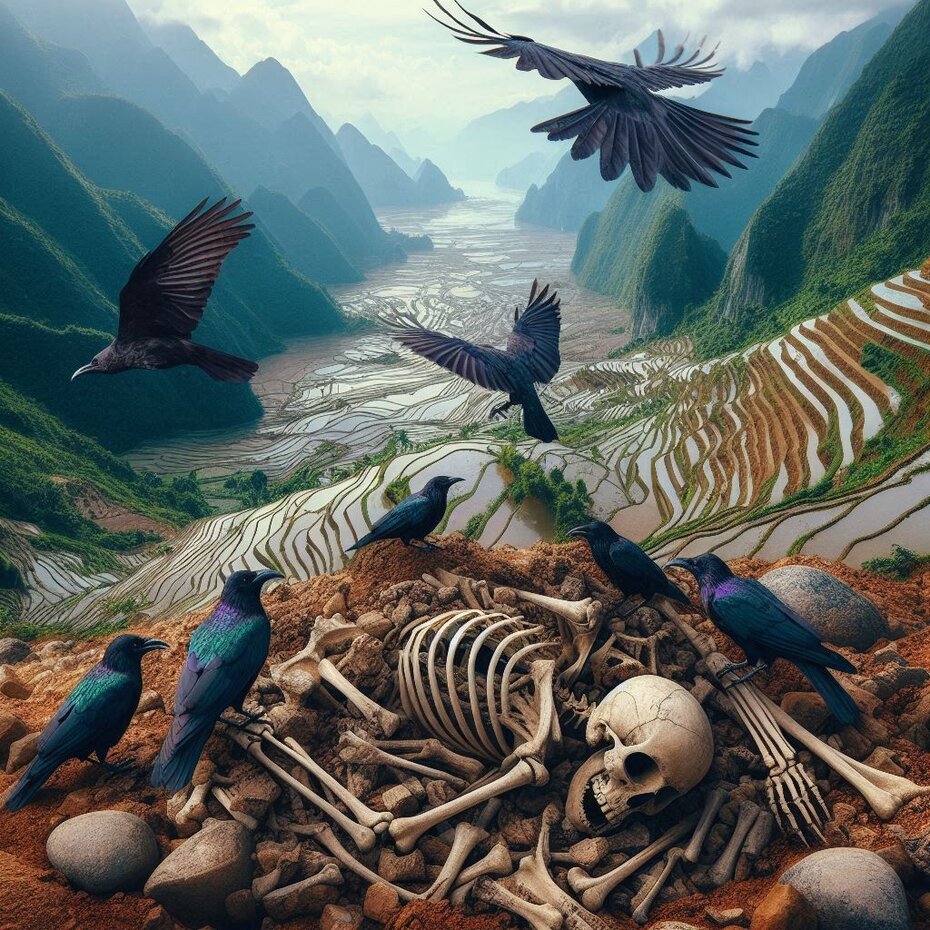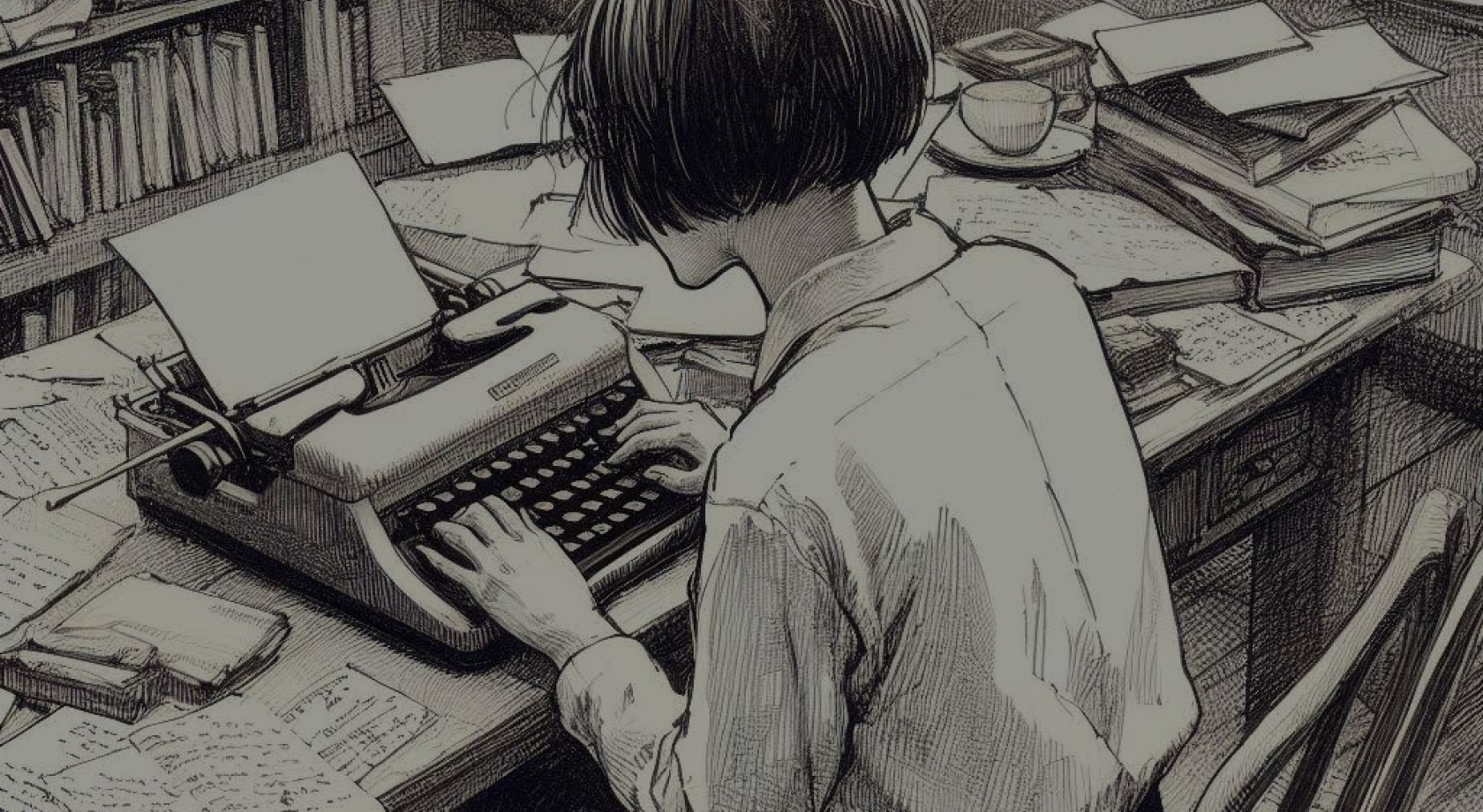With a peaceful mind and an upright spine
A dystopian tale about the life of a young girl from the post-deluge period. Her research into the fate of her great grandmother leads to great discoveries about the history of civilization during the period of climate crisis that preceded the melting of the poles and the rise of the Earth's seas.

At the end of the pre-diluvian period, long periods of drought, floods and fires of colossal proportions devastated crops around the planet, condemning almost the entire population to starvation. By the time the people realized the future that awaited them, it was too late to reverse the situation. Although death plagued every family, the rulers ordered people to avoid having children in whatever way they could. The birth of a new child would necessarily mean the sacrifice of one of their relatives. For the first time in history, everyone obeyed a centralized power without blinking and fought together against the extinction of the human race.
A postcard addressed to my great-grandmother dates from this time, and I found it tucked away among the pages of her diary. Next to the card was a richly illustrated tourist brochure, printed on glossy paper, a rare thing in those days of scarcity. The brochure showed a picture of a beautiful mountain, at the foot of which stretched rice plantations on green terraces that glistened in the sunlight. In the sky you could see a flock of crows soaring through the air with their beautiful iridescent wings. If you looked carefully, you could spot a small pile of bones at the top of the mountain. Taken aback, I credited the gloomy nature of that image to the dubious aesthetics of pre-Diluvian civilization.
The brochure read: “You are invited to discover the delights of an exotic ballad in the Narayama Mountains. Come and wander among the clouds, as if you were a bird carried by a light breeze. The Narayama Ballad Association will give you a tour in style, where you will be treated like a queen. You will be transported in a palanquin carried by attentive servants. When you arrive at your destination, you will be treated to a glass of wine aged in oak barrels and comfortably installed on eco-friendly straw mats. Take advantage of the opportunity and make this trip a priceless act of love for your family”.
I leafed through my great-grandmother's diary in search of an account of the trip, but found nothing. What an enigma! So I decided to talk about it with the community elders. It would be an excellent opportunity to learn more about the history of my ancestors. But I ended up discovering that the end of the pre-Diluvian period was considered taboo, since the survivors didn't talk about that time.
Since even my attempt to talk to my grandmother didn't work, I decided to use the digital cogniscope that is available to everyone in the community center of the village where I live. The payment for half an hour's use of the cogniscope is 5 Radiontinum Protex tablets, an exorbitant price! These tablets have been distributed to the population as payment for our work on the Hydroponic Farms since the meltwater flooded the 490 nuclear reactors around the planet. The radioactive leak has contaminated the few remaining submerged lands, putting our lives at risk. I carefully read the label on the Radiontinum bottle: potassium iodide, selenium, vitamin C, vitamin E, beta-carotene, zinc, B-complex. All essential elements to protect our thyroid from radiation. How many days of life was this research going to cost me?
I started the research on the cogniscope in a hurry, after all I only had half an hour. The water used to cool the computer center for this length of time is 15 liters. “Unthinkable”, is what everyone says about such a waste of a commodity as valuable in today's world as drinking water. But curiosity about my great-grandmother's fate was killing me.
Researching the term Ballad of Narayama led me to a Japanese movie from the 1980s. The commentary on the movie said that Narayama was a mythical mountain in Japan. “How strange,” I thought, as we live a long way from where Japan used to be. So where would my great-grandmother have gone? My attention quickly moved from this question to the social networks of the time and I ended up getting lost in a series of irrelevant topics. How much garbage!
With the help of the search engine, I discovered that at the end of the pre-diluvian period, when the situation on this planet became desperate, a new religion emerged in the region where I live today. Its believers worshipped an irreverent-looking young man dressed in a white tunic that fluttered in the wind. In the beautiful photo in front of me, I saw him clutching his guitar, shyly staring at the photographer. He became known by the codename Lux. In those times of crisis, his songs lulled to exhaustion a horde of believers who spent their days meditating in front of the sea, swaying their bodies to the rhythm of the waves. Aware that there was nothing more they could do to hold back the advancing waters, they simply chanted his mantra: “It's all a matter of keeping a peaceful mind, an upright spine and a quiet heart”.
I paused the video of Lux playing his song and went back to my research. In the time that remained, I discovered that during Lux's time there were several cases of elderly people who were invited to travel with the Narayama Ballad Association and never returned to their families. An urban legend of the time claimed that these elderly people had been sacrificed so that the remaining food would be enough to feed the younger ones.
- How ironic! - I thought, as my gaze was lost in the vastness of the sea that I could see through the window of the community center.
Although we had been surrounded by seawater ever since, the supply of fresh water was our biggest concern. Three decades had passed since the land was submerged, but we still suffered from the unpredictable weather. Science had so far been unable to find a solution to the shortage of potable water. From time to time, drought struck again and hydroponic crops were no longer enough to feed the population.
I returned home depressed about my great-grandmother's fate. How could my family have hidden her story for so many years? What kind of society was it that sacrificed the lives of its elders in exchange for food? Didn't anyone rebel?
As I approached the house, I saw that the door was open, its interior silent, abandoned. On the dining table I found a postcard that had just been delivered by post. My grandmother's name was written in the addressee field. My legs gave way under the weight of my body when I saw a picture of a mountain and a rice paddy. I sat down hastily, aware that I would never be able to comment on this story again in my life.
Translated with DeepL.com (free version)
Voltar
